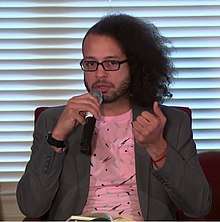Brian Nord
Brian Nord is an American astrophysicist and machine learning researcher at Fermi National Accelerator Laboratory (also known as Fermilab or FNAL). Nord is the third (and youngest) Black physicist to be appointed at FNAL.

Early life and education
Nord grew up in Wisconsin.[1] Nord studied physics at the Johns Hopkins University, graduating with a B.A. in physics in 2003, and went on to graduate school at the University of Michigan in Ann Arbor, where he got a PhD in physics. Nord's doctoral dissertation is titled Virtual Sky Surveys and Multi-wavelength Investigations of Galaxy Clusters.
Career
After getting his doctorate, Nord won a National Science Foundation (NSF) Alliance for Graduate Education and the Professoriate (AGEP) Fellowship, and remained at the University of Michigan to continue his research. In 2012, Nord became a postdoctoral associate at Fermilab, and joined the faculty of the University of Chicago in 2017.
Nord is part of Fermilab's Machine Intelligence Group, which works to apply Artificial Intelligence to a diverse set of problems in high energy physics, astrophysics, and cosmology.[2]
Nord's research focuses on a number of areas in cosmology: he studies novel methods for detecting gravitational lenses,[3] as well as cosmological survey simulation and design. Nord's work has been written about extensively in such outlets as The Atlantic,[4] Science,[3] symmetry,[2] and others.[5][6]
Honors and awards
- AGEP Postdoctoral Fellowship (2010-2012)
- University of Michigan Rackham Merit Fellowship (2004-2010)
- University of Michigan Marcellus L. Wiedenbeck Teaching Award (2009)
- University of Michigan Jerry Soffen Leadership Award (2004)
- NASA Academy, Goddard Space Flight Center Trustee Scholarship (2000-2003)
- Johns Hopkins University Hess Memorial Scholarship (2000-2003)
References
- "Bio". Postcards from the Edge of the Universe. Retrieved 2019-02-23.
- Lamb, Evelyn. "Studying the stars with machine learning". symmetry magazine. Retrieved 2019-02-23.
- StaffJul. 5, Science News; 2017; Am, 11:00 (2017-06-30). "AI is changing how we do science. Get a glimpse". Science | AAAS. Retrieved 2019-02-23.CS1 maint: numeric names: authors list (link)
- Sokol, Joshua (2017-10-25). "Using AI to Find a Cosmic Looking Glass". The Atlantic. Retrieved 2019-02-23.
- "Computer Science Technique Helps Astronomers Explore the Universe". Inside Science. 2017-01-13. Retrieved 2019-02-23.
- Cuff, James (2018-04-16). "GPUs Mine Astronomical Datasets For Golden Insight Nuggets". www.nextplatform.com. Retrieved 2019-02-23.